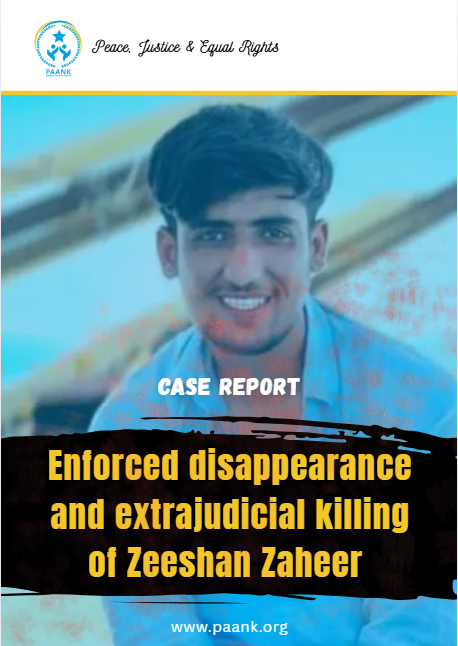Enforced Disappearance and Extrajudicial Killing of Zeshaan Zaheer
INTRODUCTION
Balochistan continues to suffer under a systematic campaign of state-sponsored violence characterized by enforced disappearances, extrajudicial executions, and collective punishment.
The case of Zeeshan Zaheer, a young student and activist from Panjgur, exemplifies the deeply rooted impunity and targeted repression faced by the Baloch people.
At the age of eleven, Zeeshan witnessed the enforced disappearance of his father, Zaheer Ahmad, by Pakistani security forces in April 2015. Despite persistent threats, Zeeshan grew into a courageous advocate for the disappeared, becoming a member of the Baloch Yakjehti Committee (BYC) and an active organizer of peaceful protests and awareness campaigns. On 29 June 2025, Zeeshan was abducted by a state-backed death squad in Panjgur. His bullet-riddled, tortured body was discovered the following morning. His killing sent a message to those who raise their voice against injustice in Balochistan.
This Report documents Zeshaans’ Life, activism, and unlawful Killing, and call for justice and accountabilty
VICTIM PROFILE
- Name: Zeeshan Zaheer
- Father: Zaheer Ahmad (Forcibly disappeared on April 13, 2015)
- Date of Birth: 1 June 2005
- Age at time of death: 20
- Place of Residence: Khudabadan, Panjgur,
- Occupation: Student, footballer
- Affiliation: Member, Baloch Yakjehti Committee (BYC)
Circumstances of Abduction and Killing
On the evening of 29 June 2025, Zeeshan was returning home from a football match with teammates when two vehicles blocked their path in the Niwan River area. Masked men—believed to be associated with Pakistani intelligence—abducted Zeeshan at gunpoint in front of witnesses. Local police confirmed he was abducted within the jurisdiction of City Police Station, Panjgur.
Despite an FIR (No. 57/2025) being registered, Zeeshan’s body was found just ten hours later, dumped in the Surdu area, under the jurisdiction of Vishbud Police Station. The post- mortem report confirmed six to seven gunshot wounds, all to the chest, and visible signs of
torture.
The brutality of the killing—both its method and its timing—appears intended to terrorize the local community and silence voices of dissent.
Personal Background and Testimony
Zeeshan Zaheer was a resident of Khudabadan, a town in Panjgur city. According to his family, he was around 20 years old and the eldest of four siblings. Zeeshan was a dedicated student who had recently applied for university admission in Multan. His name appeared on the official admission list on 23 July—three weeks after his murder.
He was also a gifted footballer, playing as a goalkeeper in a local club. Following his father’s disappearance, Zeeshan became the family’s sole provider, working labor jobs to support his mother and sisters.
His Sister Shared:
“Zeeshan was not just our brother—he was our father, our friend, our support. They took everything from us. First our father, now Zeeshan.”
Zeeshan’s leadership and empathy extended beyond his family—he was known in his community for helping others, often quietly and without seeking recognition.
Pattern of State Violence and Torture
Zeeshan’s case is part of a broader, well-documented pattern of human right violations in Balochistan. PAANK’s documentation confirms his body bore:
- Deep lacerations and puncture wounds
- Multiple fractures and blunt trauma
- Burns consistent with electric shock torture
- Execution-style gunshot wounds
These indicators align with torture techniques previously documented in other cases:
- Electrocution
- Mutilation of soft tissue
- Prolonged sleep deprivation
- Psychological torment and threats to family
- Denial of medical care
These acts are in violation of international human rights norms, including Article 5 of the Universal Declaration of Human Rights and the Convention Against Torture (CAT), to which Pakistan is a signatory.
Community Impact and Collective Punishment
Zeeshan’s killing has devastated his family and community. His football club remains closed in mourning. His death is widely seen as a warning to others who speak against state repression.
The family, already traumatized by the decade-long disappearance of Zaheer Ahmad, now grapples with the loss of their only son and provider. His sister noted: “We were still searching for our father. Now, the state has stolen our brother, too. There is no one left to support us.”
Broader Pattern of Fake Encounters
Zeeshan’s case is not an isolated incident. In recent months, Paank has documented a disturbing increase in extrajudicial executions disguised as armed encounters:
- Shahzeb Ahmed & Saifullah (Mangochar): Tortured and dumped in the same area
- Masood & Bebagr Baloch (Turbat, Awaran): Abducted and found mutilated
- Nawab (Kolwah-Hoshab): Arrested alive, found dead within 72 hours
- Dil Jan (Turbat): Body found with signs of execution
Structural Impunity
Despite repeated evidence of grave human rights violations:
- No officers have been prosecuted
- No independent investigations initiated
- Victims’ families are harassed or silenced
- State institutions operate without judicial oversight
This impunity emboldens further abuse and normalizes violence as a state tool of control.
Paank’s Call to Action
Paank urges:
- UN Human Rights Council & OHCHR to initiate urgent investigations
- The EU and GSP+ authorities to re-evaluate Pakistan’s trade privileges
- ICC mechanisms to be activated if Pakistan continues to deny accountability
- Protection for victims’ families, including legal aid and reparations
- Immediate ban on enforced disappearances and ratification of relevant international conventions
Family Demands
The Zaheer family demands:
- Immediate prosecution of those responsible for Zeeshan’s killing
- Recovery of their forcibly disappeared father, Zaheer Ahmad
- Protection for the remaining family members
- End to collective punishment and harassment of activists’ families
Supporting Evidence
The following documents will be submitted:
- Zeeshan Zaheer’s National Identity Card (NIC)
- Educational records
- Filed FIR and family testimony
Conclusion
Zeeshan Zaheer’s life was one of resilience, duty, and compassion. His murder is both a personal tragedy and a glaring example of the violent machinery of state repression in Balochistan. PAANK stands in unwavering condemnation of this act and calls upon the global community to break its silence and demand justice.

